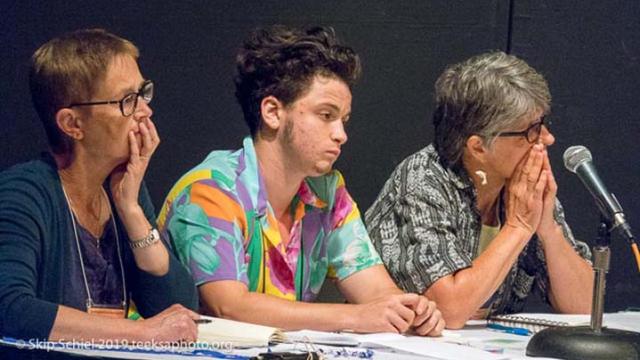
The Elders for Noticing Patterns of Oppression and Faithfulness were an outgrowth of the work of the Working Group for Noticing Patterns of Oppression and Faithfulness. The Working Group was formed by Ministry and Counsel in response to a charge from the Yearly Meeting to: “Develop a practice to appoint people who will observe, name, and reflect back to us long-standing, (unseen) patterns and practices that result in our complicity in oppression.” (Minute 2018-53) I wrote this piece for my monthly meeting community to share with them my experience at NEYM sessions.—Melissa Foster
August 9, 2019
This past week at Yearly Meeting, I spent hours and hours noticing. I was serving as one of three Elders for Noticing Patterns of Oppression and Faithfulness at New England Yearly Meeting Annual Sessions, a task I felt ill-prepared for, but somehow led to take on.
Let me tell you what that was like. I felt in my body the pain of the Elder next to me on the stage when their identity was erased twice in a matter of hours by comments that denied their existence as a non-binary person of color. I heard them tell me about many, many other instances of erasure that they shrugged off and swallowed in order to remain with us all week. I heard wealthy white Friends cherish their pain, cling to their pain, and prioritize their pain over that of people who are suffering directly from the personnel policy of Friends United Meeting. There was plenty of pain to go around in the room during the multiple discussions on this fraught issue, but it was clear that they could only feel their own. I heard “weighty” Friends make hurtful jokes about things like getting consent before touching another; about people who have hearing loss; about the inconvenience of Spanish language translators. I watched Friends who hold powerful positions in the Yearly Meeting falsely deny their own power. I saw brown and black Friends hurt by comments that said “we” this and “us” that, that didn’t actually include them and their experiences. I heard repeated assumptions of financial and educational privilege that were hurtful to Friends from working class backgrounds, and those whose experiences were not reflected in these assumptions. I heard people talk about the safety and sanctuary of our Quaker community in ways that do not reflect the experience of a black Friend who felt the need to leave Sessions rather than endure another day of the micro (and macro) aggressions that white Friends deny or downplay or excuse. I learned during the week that noticing is like a muscle, in that the capacity to do so increases dramatically with use.
I started the week at Yearly Meeting sessions with the fear that we might not notice anything and look foolish for being on the stage. The elders ended up noticing so many things that we were unable to include them all in the report back to the body, which had a 10-minute time limit imposed, and we committed to writing a report to include all of our noticing and the many comments and notes shared with us by Friends during the week.
Let me be clear. Prior to this exercise, I would not have noticed the vast majority of these patterns. I, like many of us white, warm-hearted, open-minded, loving Quakers, have been blind to our own complicity in these patterns. Our blithe, comfortable assumptions that all are welcome are untrue and are causing real harm to people we claim to welcome and love.
At the end of our report back to the Yearly Meeting, one of the elders, Eppchez Yes, offered the following prayer:
“We love ourselves unconditionally. We forgive unconditionally. We feel ourselves loving ourselves unconditionally. We feel ourselves forgiving ourselves unconditionally. We thank you. We thank you. We thank you.”
I ask my community of Framingham Monthly Meeting to take into our hearts the important work of examining ourselves deeply and of noticing how our words and actions and inactions impact people different from us. Ways into noticing include: “I see …”, “I hear …”, “I feel … ”, “I know …”, “I wonder …”.
Thank you, Friends.